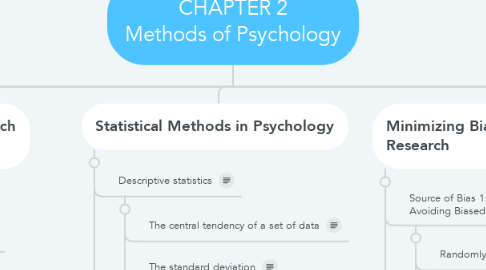
1. Lessons From Clever Hans
1.1. Observations, Theories, and Hypotheses
1.2. The Importance of Skepticism
1.3. Observation and Control
1.4. Observer-Expectancy Effects
2. Types (dimensions) of Research Strategies
2.1. The research design, of which there are three basic types: experiments, correlational studies, and descriptive studies.
2.1.1. Experiments studies
2.1.1.1. Within-subject (repeated-measures experiments)
2.1.1.2. Between-groups experiments (between-subjects experiments)
2.1.2. Correlational studies
2.1.3. Descriptive studies
2.2. The (research) setting in which the study is conducted, of which there are two basic types: field and laboratory.
2.2.1. Laboratory study
2.2.2. Field study
2.3. The data-collection method, of which there are two basic types: self-report and observation.
2.3.1. Self-report methods
2.3.1.1. Questionnaires and interviews
2.3.1.2. Introspection
2.3.2. Observational methods
2.3.2.1. Tests
2.3.2.2. Naturalistic observation
3. Statistical Methods in Psychology
3.1. Descriptive statistics
3.1.1. The central tendency of a set of data
3.1.2. The standard deviation
3.2. Inferential statistics
3.2.1. Correlation coefficients
3.2.2. Statistical Significance
3.2.2.1. Level of significance.
3.2.3. The calculation of a p value
4. Minimizing Bias in Psychological Research
4.1. Source of Bias 1: Biased Samples Avoiding Biased Samples
4.1.1. Randomly
4.1.2. Non-representative
4.1.3. (WEIRD) societies
4.2. Source of Bias 2: Measurement Error and Bias Reliability and Validity of Measurements
4.2.1. Reliability
4.2.1.1. Replicability
4.2.1.2. Interobserver (or interrater) reliability
4.2.2. Validity
4.3. Source of Bias 3: Expectancy Effects Avoiding Observer-Expectancy and Subject-Expectancy Effects
4.3.1. Observer-Expectancy Bias
4.3.2. Subject-Expectancy Bias
4.4. Replicating Earlier Studies
5. Ethical Issues in Psychological Research
5.1. Research With Humans
5.1.1. The person’s right to privacy.
5.1.2. The possibility of discomfort or harm.
5.1.3. The use of deception.
5.1.3.1. Opposition to all use of deception
5.1.3.1.1. (a) is intrinsically unethical
5.1.3.1.2. (b) undermines the possibility of obtaining truly informed consent
5.1.3.2. Justification off the use of deception
5.1.3.2.1. White lies
5.1.3.2.2. Telling that some details of the study must be withheld.
